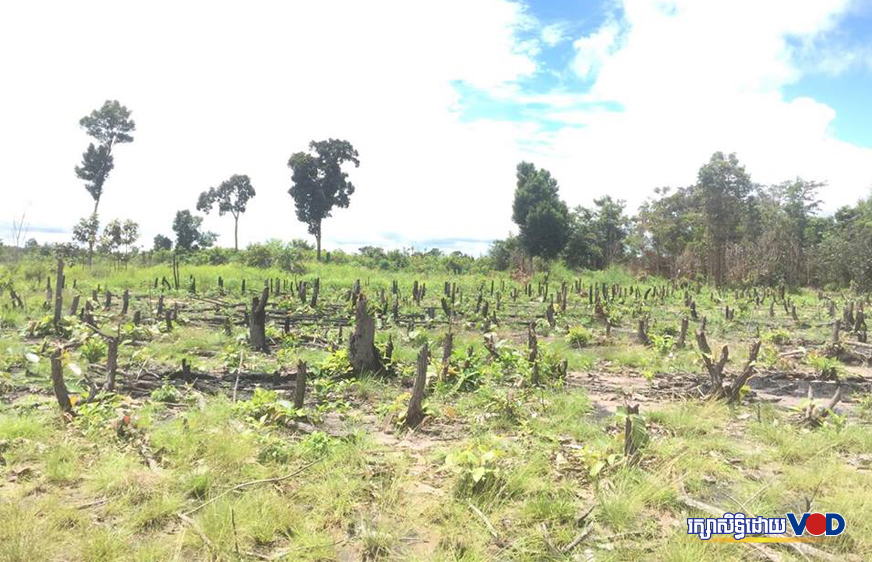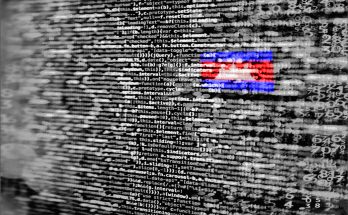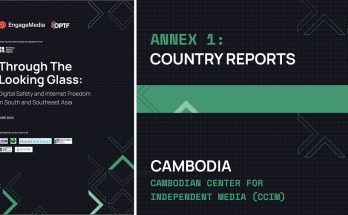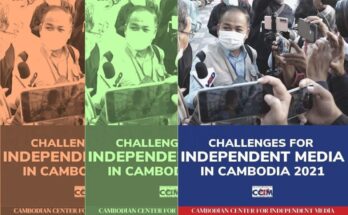Cleared community forestry in Kompong Thom.
How community forestry is depleted
A community forestry in Kompong Thom has been logged and grabbed by individuals for illegal trading owing to inactivity of the community leaders. This community forestry was established by a proposal from 60 families in 2004; at the very beginning, there were only three or four families moved there and started making a living with charcoal kilns. According to the local authority, more families moved to the community forestry, grabbing the land for farming during 2007 and from 2009 up to now.
An official at Sala Chdao Commune told that due to charcoal business, more and more people come to the community forestry to make a living in charcoal kiln. Later on, they sold their ancestor lands and came to live around the community forestry and built houses subsequently. It is the main reason why a significant part of community forestry is depleted.
A commune official said there are now 16 families from Krerl Village who illegally grabbed the forestland as well as another nearby 175 families making a living on the forest products in the “Sala Chdao” community forestry, most of whom are indigenous ethnic KUY who is making their traditional living such as farming, and forestry gathering.
Mr. Soem Oeun, 49, living in KouKi village, Sala Visay Commune, Prasat Balaing district, said the ethnic KUY in the area mostly earn their living by forestry gathering and farming, but those who don’t possess any pieces of land have to grab and log the community forestry.
Mr. Soem Oeun continued that since the establishment of the community forestry, there has been an acceleration in land grabbing and logging from individuals. And yet he suspected that there is a possibility of illegal traders in the area, which makes other local communities to engage in deforestation.
He claimed that some families even possess land title thereby selling it to businessmen from Phnom Penh and to people from other villages who are not dependent on the forest products.
He said “in this area, Snao, Plong Nei, some people involved in logging were in this village then moved on to establish new villages namely Snao Village and Plong Nei Village..oh 3 villages actually, one more is KouKi Village but there is only one village chief. After selling the land here, they moved there; initially they didn’t possess any piece of land so only forestry gathering and farming. People here have no farm land, ranging from here but over there at Sala Visay there is land available, the land here is logged and grabbed probably for a couple years then they moved to the next forest land.”
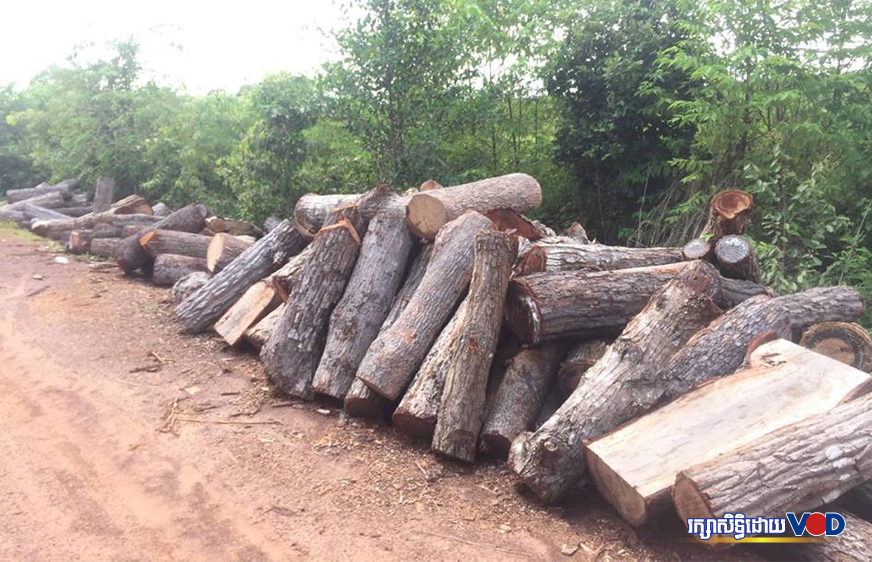
Mr. Soem Oeun claimed that he personally talked to the villagers and they said due to their poor living conditions, they had to sell the land to the businessmen from Phnom Penh. He continued that those businessmen brought bulldozers to clear the community forestry claiming that they possess valid land titles. He agreed that after the community forestry is established, there should be no selling or transferring to any third-party. Any officials who dares to sign on the deal have to be legally responsible.
Another villager Ms. Nhoem Hoeun, 60 years of age, said that she has really bought a piece of land in the community forestry in Sala Chdao from an individual named “Ta (grandpa) Sok” in the year of 2000 for purpose of planting cashew and cassava. She claimed that she bought the land from “Sok” without any written contract so it was just a verbal agreement between both parties.
Ms. Nhoem Hoeun claimed that she has moved here even before the community forestry was established and in 2012 the “Samdach Hun Sen” Student Group came here to process the land measurement and distribute the land for everyone but no hard title was provided.
She said “I have not signed on anything, first he took money from me and when he could return the money he said Bong (sister) Hoeun farms that land; I would not as I didn’t have money to return to you as you know my wife is disabled and desperate so he said Bong (sister) Hoeun farms that land then. I was growing cassava during visit of the Student Group and I already built the fence for growing cassava, yeah I did the farming, not my children, but myself.”
In accordance with a letter signed on 20th July 2012, the government permitted Public Land Management Authority in Kompong Thom Province collaborated with the volunteer students to process the land measurement in the community, allowing local residents who had lived there to be able to own the land. However, no land title was provided. According to the letter, the student group would not be able to process the measurement if there was a conflict on the land or in the case that the residents started living here after 07th May 2012. This is based on the document provided by Ms. Nhoem Hoeun.
Mr. Phok Chanpeaktra, a commune official of Forestry Administration in Sala Visay cannot explain how much the community forestry is left after the measurement and distribution done by the Student Group.
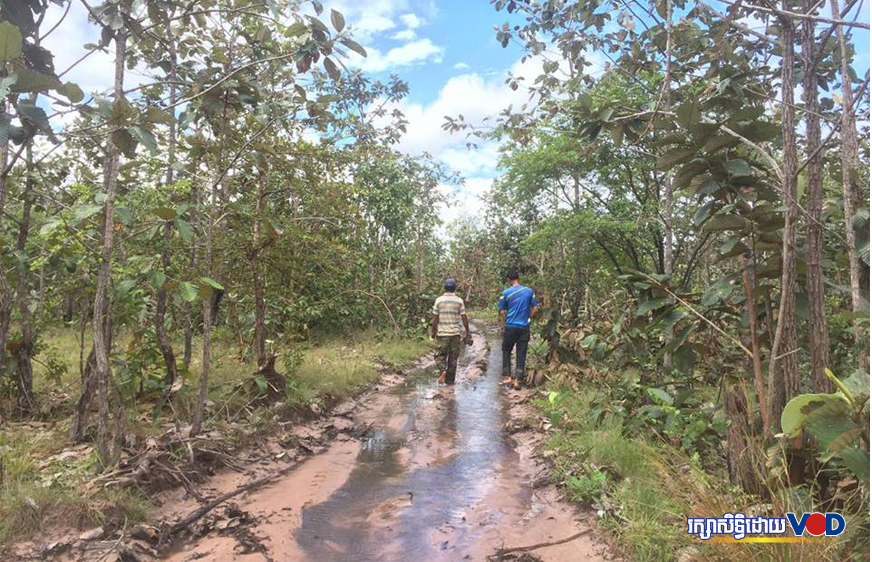
Another seven families who were interviewed said that they really logged the community forestry to get timbers for building houses and use the land for farming, some also accused that the logging is to trade timbers. The villagers suspect that there can be a conspiracy between the previous committee members of community forestry and local authority and it also involved the selling of community land as well. They claimed there were bulldozers clearing the forestland and yet those individuals claimed that they possess valid land title.
The villagers claimed that: first “when seeing the logging, we also logged, when they cleared a couple places, everyone also logged especially in the cleared areas.” Second, “if the middleman were in the community, they would be removed; when the owners clear the forest land then we know their activities”. Third “that is why I talk about that village, when the community forestry is issued with the title, no private title can be issued then. This is the first term, and the second term is if anyone dares to sign, they will be legally responsible for it.”
Another family Ms. Hut Sophea and her husband Lay Kimlong told that they bought a piece of land in the community forestry. According to them, that land is 5 hectares, equivalent to $5,500 (five thousand five hundred USD)
In accordance with the hand-written contract, the purchase of land is signed by Mr. Chun Khun, the community chief of Sala Chdao, on June 2017.
Ms. Hut Sophea said: “I bought an old mango plantation-land which was farmed since 2002 and bought from the husband named Yorng Aom and his wife named Liem Pat and there were cashew products on the land at that time. I bought it at 1 thousand 1 hundred USD for one hectare and in total there are 5 hectares”.
We went to meet the community chief at his house Mr. Chun Khun but could not reach him for any comments. VOD tried to contact his phone numbers for many times but then the number was unable to contact anymore. Nevertheless, the commune officials told us that Mr. Chun Khun has already fled to Thailand. Another citizen asking for being anonymous gave us an audio recording which was recorded at Mr. Thuk Nel’s house, a former committee member of community forestry, on August 2017. The conservation in the recording reveals the negotiation and money sharing after selling a piece of land in the community forestry.
The former committee member during 2004-2007, Mr. Thuk Nel denied that he didn’t know about the land trading in the community forestry. Yet he recalled that before the Sala Chdao community forestry was acknowledged in 2009, there were not many people came to live here, just a few families and “Chhing Khun” family was the first.
He mentioned that when he was the community leader, he also faced some issues regarding the land trading, claiming Mr. Yart Phot, First Deputy Commune Chief, was involved in the signature on the deal.
He said “I don’t know; if unclear, I won’t say because I don’t know; if I just overheard from others, I won’t say anything as it is not true […] because of this land when I was the community chief, I know about it and I talked to the village chief from where you bought a piece of land in the community land; I would not process for you and he was angry and yelled at me. Put my name, I didn’t go there, still they put my name and I said no my name involved because I didn’t go there to check the land why you put my name and then he said no problem Phot (Yart Phot)”.
Another villager Mr. Saom Yuri said his uncle and his father SaomPhon bought land in Sala Chdao community since 2007 and his father divided that land for his seven children, each one got five hectares. But when they bought the land, they didn’t know about the establishment of community forestry and he said the authority didn’t explain about this at all.
He said “5 hectares is a lot, each has its owner, in short 7 siblings: Saom Phai, Soam Socheat all got 5 hectares. There was no authority, I didn’t know about this, if I did, I wouldn’t buy it either”.
The sale contract provided by Mr. Yuri shows that there is a signature of Mr. Heng Ly, Deputy Chief of KouKi village, and Mr. Yart Phot, the Commune Chief of Sala Visay. The contract was signed on 29 November 2007, 3 years after the area was integrated into the community forestry.
Mr. Thuon Lin, former chief of community forestry between 2004 and 2007, recalled that during his leadership, there were not many land grabbing cases. But he said after he asked to resign, the grabbing cases were significantly increased because individual citizens sought the land for farming and housing.
Mr. Thuon Lin said after there were repeated changes in the community forestry committee in that under leadership of the community forestry chief Chun Khun, the forestland has been subsequently depleted. He said Chun Khun doesn’t care about the depletion of the community forestry. Another reason is that individual citizen keep logging the forestland, leading to conflict, and even using violence against the authority.
He said “we stop them but since everyone is logging, the others just follow. In every meeting, we prohibit the logging, but everyone doesn’t listen, the villagers themselves. The commune chief said the others log and grab and earn money, so why don’t you, Chun Khun”
Chea Sovannarith, a Program Officer from Advocacy and Policy Institute, stated that in accordance with Law on Forestry, those individuals cannot grab the forestland after the community forestry is established and acknowledged by the government. He said there are many factors contributing to the depletion of the community forestry such as logging activity by the villagers and the weakness of the community forestry committee.
He said “after being acknowledged, even not at the national level, just at commune or district level, no one has rights to measure the land and sell it to a private company. If they really want to sell the land, there must be an agreement among key stakeholders at the national, district and commune level. On the other hand, the problems were resulted from the consecutive conspiracy at the local level especially the community which has not been properly registered. So when there is no proper registration, there is also no precise boundary or territory. So it is not clear from where exactly is community land or private land of villagers”.
Phok Chanpheaktra, Forest Administration officer in Sala Visay Commune, recalled that the community forestry grabbing has started a long time ago and the Sala Chdao Community Forestry is left about 30% only, he estimated.
He told us that the authority come to investigate to find out who was involved in that the authority found 55 nearby families are dependent on forestry products and the land grabbing in 7 areas in 2016.
According to Mr. Phok Chanpeaktra, the authority has found 7 land titles with legal ownerships accounting for 30 hectares but there is no legal action as those titles are signed by the Director of Department of Land Management, Urban Planning, and Construction in Kompong Thom Province.
Sala Chdao Community Forestry
Chin Hin, the commune chief of Sala Visay, stated that the Sala Chdao community forestry is very important as it provides shelter for wildlife, farming land, flood and climate change prevention, and support the villagers’ daily life.
According to the statistic report in 2017 in Sala Visay Commune, Prasat Balaing district, there totally 2377 people or 323 families, most of whom are the ethnic KUY who makes a living on forestry gathering, logging for sales and farming.
The Sala Chdao community is located in KouKi Village, Sala Visay Commune, Prasat Balaing district, Kompong Thom province. It was initiated in 2004 and acknowledged in 2009. The community forestry accounts for 1006 hectares.
According to the commune officials, since the establishment of the community forestry committee, there have been three mandates of the committee, yet there have been only two chiefs of the committee, Mr. Thuok Nel and Mr. Chun Khun.
The data from Open Development Cambodia shows that there are 337 community forestry throughout Cambodia. Each community accounts for difference sizes with the least of 10 hectares and the largest 5000 hectares.
In accordance with Prakas on 19 September 2008, at the beginning there were 48 community forestry accounting for 40,865.91 hectares in Kompong Thom then it reaches 82 community forestry in 2013. According to commune officials, there are 11 community forestry in Prasat Balaing district in that the most vulnerable community forestry is “Sala Chdao” and “Chorm Mret.”
The community forestry is regulated by Law on Forestry in 2002 and the sub-degree in 2003 includes regulations for establishment, management and utilization of community forestry in Cambodia. In accordance with the law, the Ministry of Agriculture, forestry, and Fisheries is obliged to assist and control the community forestry.
New Community Committee
Mr. Chin Hin, the newly-appointed commune chief of Sala Visay, stated that since the depletion of community forestry is observed, a new community committee was created by the local authority and Forestry Administration District in order to do survey and solve problem accordingly.
He said the working group faced many problems such as lack of community forestry relevant documents, community population that took over the forestland, the remaining forestland and identification of businessmen involved. He claimed the community forestry chief always avoid them and is not willing to cooperate.
Not difference from other local officials, Mr. Chin Hin explained that it is the ethnic KUY who is living around the community is the ones who log the forestland and in some cases they even fight against the law enforcers.
He said “But the survey has not been finalized, because the community chief often avoids giving information so it is difficult for us to communicate and the villagers report to us that Chun Khun is involved […] and Khun bluffed that someone else did and now he came it was even more until now we cannot find someone to stand in the committee. We sued those who logged the forestland but when the community itself logs, they will be arrested so no one dares but Khun claimed he could solve it, then it is even worse…”
Mr. Phok Chanpeaktra insists that we need all stakeholders involved and more importantly the community forestry committee must have a precise management plan in that reforestation and logging prevention.
He said “it is not just about some members in the community committee, other stakeholders need to be involved in order to protect the community forestry in the long term. He must prepare a plan dividing which areas will be used for producing beams, poles or woods; which areas to be reforested or reserved. There must an annual plan working along with the Forestry Administration as well as other organizations that financially support and assist”.
This commune officer of Forestry Administration continued right now the Forestry Administration along with relevant authority are making an effort to arrange the election for new community committee and also seeking more evidences which can lead to the arrest of those offenses.
In order to preserve the Sala Chdao Community Forestry, Mr. Chea Sovannarith convinces relevant authority to firstly strengthen the community committee, then raise awareness among the local residents and more importantly to find solution for the current conflicts by providing some compensation so that they are willing to leave the forestland.
According to Mr. Phok Chanpeaktra, the commune authority issued warning letter and consecutive agreements to stop all illegal activities after the incidents occurred such as illegal logging and making charcoal kilns in the community forestry. However, it has yet to go bring the cases to court.
He added that the community forestry committee to be established must be empowered to be self-controlled, raise awareness among the community as well as participation from the Forestry Administration District and identify a precise annual management plan so as to guarantee the sustainability and balance of community forestry.
Destiny of local residents around the community forestry
Mr. Phok Chanpeaktra told us that for people who possess land title will be allowed to continue making a living there or not unless it is decided by the top authority. On the other hand, for new illegal comers and other people involved are being identified and the cases will be brought to court. Nevertheless, he clarifies that for nearby residents are allowed to stay and but the authority will mark the boundary for the community forestry so that there will be no further grabbing.
Legal sanctions on the offenders
The law on forestry in Cambodia explained that any land grabbing in the preservation areas or community forestry must be sentenced from one-year to five-year imprisonment and fined from 10 million riels to 100 million riels. Illegal activities include non-compliance with management plan, misuse of a forest use permit to build house.
The law also permits the forestry administration to issue warning letter or provide compensation and bring the cases to the court if the offenders are not willing to comply with fines and don’t stop illegal activities.
The law also states that local authority and the police officers who directly involved in illegal activities or facilitate the exploitation shall be subject to one to five years in prison and fines of ten million to one hundred million Riel.

